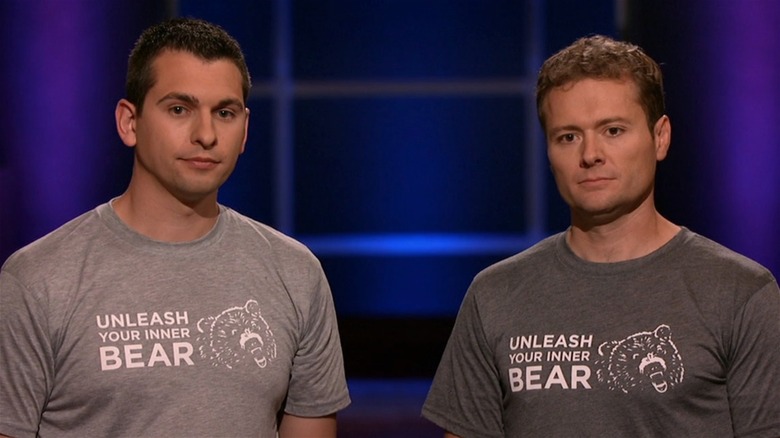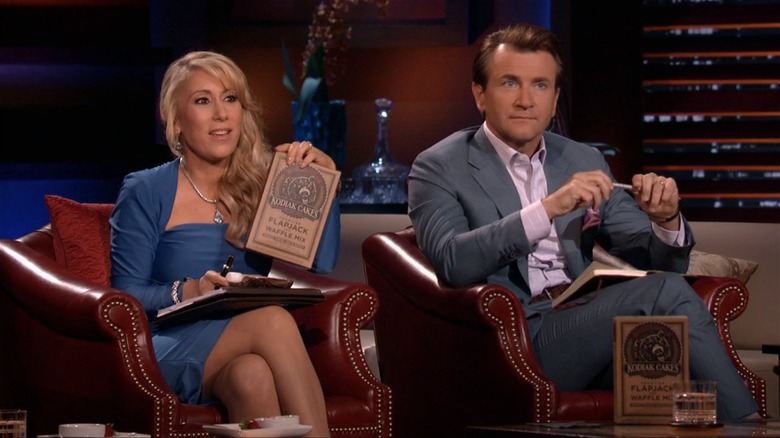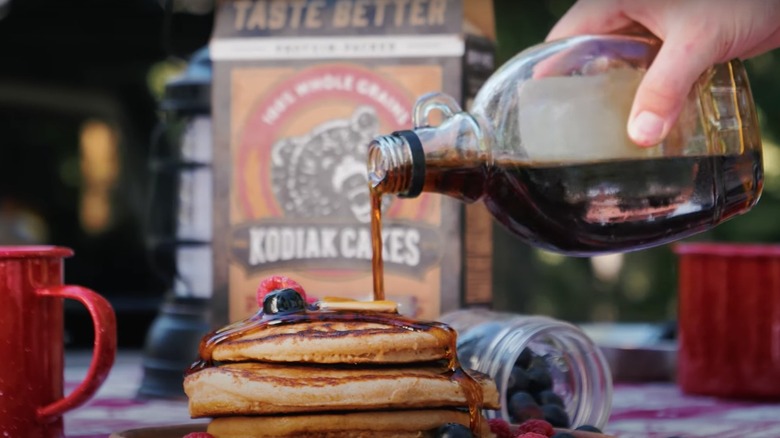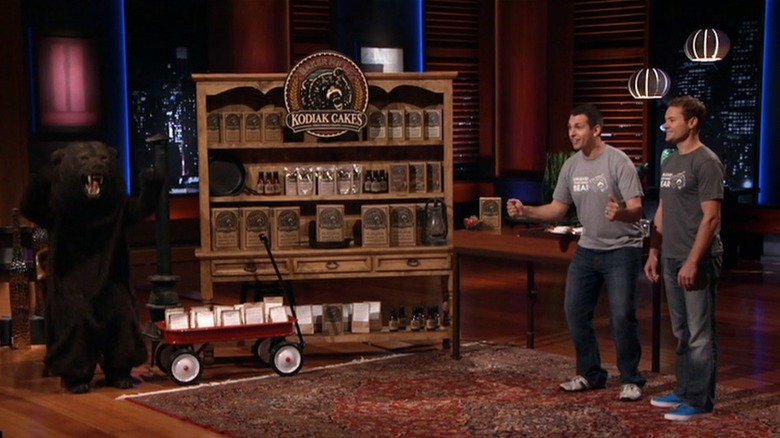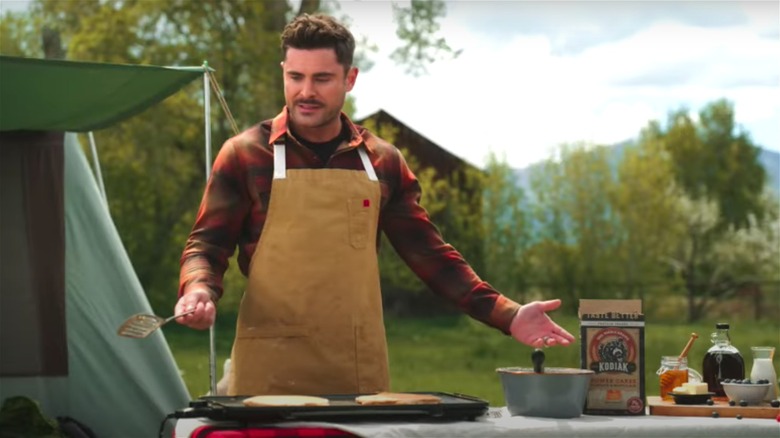Whatever Happened To Kodiak Cakes After Shark Tank?
Kodiak Cakes made its "Shark Tank" debut in 2014, but the company's story began decades ago. Kodiak Cakes CEO Joel Clark's mother, Penny, began selling her homemade pancake mix out of paper lunch bags in 1982. A young Joel helped too, bringing the bags door-to-door in a red wagon. Penny's fledgling business was short-lived, but in 1995, her son Jon formally launched Kodiak Cakes using the same recipe.
Jon ran the company as a side hustle for a couple of years until, in 1997, he turned operations over to his brother Joel, who was then a 23-year-old student at the University of Utah. Plenty of lean years followed as the younger Clark brother ran the business at night and earned his MBA during the day, working odd jobs to keep himself afloat. With the help of his father, Richard, Joel took Kodiak Cakes from earning $150,000 in 2004 to $800,000 in 2007. Despite the growth, Clark sold the company and took a job in the healthcare sector. But having already put in over a decade of work, he executed a clause in the contract and canceled it within a year, returning to the company his brother founded.
In 2009, he hired Cameron Smith — coincidentally a 23-year-old University of Utah student — and he climbed the ranks to COO. Four years and a healthy amount of growth later, Smith emailed the "Shark Tank" producers, asking if Kodiak Cakes could be featured on the show.
The flapjack company flopped on Shark Tank
Cameron Smith and Joel Clark made their "Shark Tank" debut in Season 5, Episode 22, which aired in April 2014. By then, the company was a sizable enterprise with its foot in the door at Target, having hit $3.5 million in sales in 2013. Still, Smith and Clark arrive on the show seeking $500,000 in exchange for 10% equity in Kodiak Cakes in the hopes of expanding their business and securing additional shelf space in the form of slotting fees.
The Sharks love the pancake mix and the berry syrup, as well as the brand's rustic packaging, but none are quite ready to sign a check. Kevin O'Leary is concerned about competitors, particularly a "famous aunt," who sold their mixes for half the price. He's also dubious of Kodiak Cakes' $5 million valuation.
Lori Greiner and Mark Cuban both bow out, with the former citing her dislike of pancakes. Smith and Clark are ultimately left to consider two offers: $500,000 for 35% from Robert Herjavec or a joint deal of $500,000 for 50% from O'Leary and Barbara Corcornan. The pair decline the offer and exit the tank, but not before Cuban commends them for holding their own, saying, "I think you guys are smart."
Kodiak Cakes powered up after Shark Tank
Despite walking away from the Sharks' offers, Kodiak Cakes immediately felt the "Shark Tank" effect spring into action. Within six weeks of the company's episode airing, Kodiak Cakes netted an estimated $1 million in sales. It helped, of course, that the pancake mix was already available to shoppers at Target and Safeway.
The surge in sales was vindicating for Joel Clark, whose product failed to wow the Sharks. "That's what it kind of felt like this whole time, this battle trying to get them to align with us," Clark recalled to CNBC. "When they low-balled us, and we walked away, I actually felt sort of relief, which is kind of funny. Because I think I felt like, well, they aren't on-board, they didn't see the value even close to where we saw."
Sales really began to skyrocket in June 2014 when Kodiak Cakes launched a new pancake mix, Protein Power Cakes. The whole grain mix offered 14 grams of protein per serving — roughly twice the amount of the regular pancake mix. "That just shot to the top," Clark recalled. "That immediately became the No. 1 selling pancake mix at Target by about 20 percent. ... It just immediately became No. 1 and resonated with millennials like crazy."
Kodiak Cakes keeps climbing
Kodiak Cakes continued its upward climb in 2016, when Sunrise Strategic Partners made a minority investment in the company. By 2018, Kodiak Cakes had topped PepsiCo's Pearl Milling Company (formerly Aunt Jemima) and General Mills' Bisquick as the best-selling pancake mix brand at Target. In 2020, Kodiak Cakes' annual sales hit $200 million.
There have been some hiccups along the way. In 2018, the company had to recall its Blueberry Chia Energy Waffles when it failed to include milk on the product's list of allergens. Nevertheless, Kodiak Cakes' lineup of goods has continued to grow and now includes dozens of products, including oatmeal, granola bars, muffin mixes, and instant "Kodiak Cups." They're more accessible than ever, too, thanks to Kodiak Cakes' customizable subscription boxes.
Aside from its material offerings, Kodiak Cakes has also grown as a brand and leaned into its outdoorsy roots (Kodiak is, after all, named after a bear). The company's Keep It Wild initiative regularly partners with non-profit organizations like Polar Bears International and Vital Ground Foundation in support of wildlife conservation efforts. Kodiak Cakes also works with athletes and nutritionists to promote its message as a health-forward food company.
What's next for Kodiak Cakes?
Kodiak Cakes has come a long way since its first pancake mix was sold from a little red wagon. In 2021, the company was acquired by private equity group L Catterton for what is believed to be $800 million. More changes were in store for Kodiak Cakes, and in November 2022, Joel Clark handed over the reins to new CEO Valerie Oswalt. Cameron Smith also stepped down from his role as president, though the co-founders remain minority investors in the company.
Under Oswalt's stewardship, Kodiak Cakes has attracted a number of high-profile investors, including Travis Kelce and Joe Burrow, through the private investment platform Patricof Co. In 2022, Zac Efron joined the company as its Chief Brand Officer and board member.
"One of the coolest things about our partnership is I'm not just lending my name to the brand," the actor told Forbes. "They're actually giving me the opportunity to roll up my sleeves and collaborate on everything from new products to ideas like branded apparel and several give-back initials, which are all really fun." Indeed, Efron has been the face of a number of video campaigns for Kodiak Cakes, including an ad on YouTube that promotes the company's bear habitat conservation efforts.
The expanded outreach has also helped contribute to the brand's rising revenue, which nearly hit $500 million in 2022. "I'm really optimistic and the growth is going to continue," Oswalt told Food Dive, "and as we get scale, it's going to allow us to invest differently in the business."
